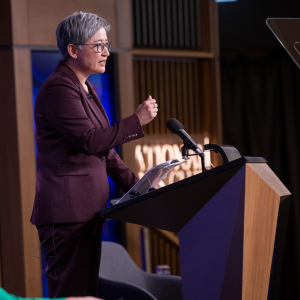Since the announcement of further details of the Australia-United Kingdom-United States (AUKUS) partnership last month, there has been heated discussion in Australia about the merits of the deal and whether Australia requires its centerpiece nuclear-powered submarines. One of the most critical voices has been former Prime Minister Paul Keating.
This week, Minister for Foreign Affairs Penny Wong hit back with a speech at the National Press Club explaining that Australia’s foreign policy is far more than the AUKUS deal. She outlined a vision of harnessing “all elements of our national power to advance our interests.”
It is an important recognition that investment in military hardware should not be the only way that Australia thinks about its security. Our latest options paper for Asia-Pacific Development, Diplomacy & Defence Dialogue (AP4D) – “What does it look like for Australia to….Use All Tools of Statecraft in Practice” – argues that effective statecraft requires an understanding of all the instruments at Australia’s disposal, as well as sophisticated coordination of these instruments. This is an area that is receiving increasing bipartisan support.
Wong endorsed this “all tools” approach, describing strategic competition as operating on multiple levels including economic, diplomatic, strategic, and military. This means that “effort cannot be left to one or another arm of the Australian Government. Our diplomats cannot do it alone, nor can our military… It takes investment in all elements of our national power.”
While Wong strongly defended the acquisition of nuclear-powered submarines, she placed it in a context where defense and diplomacy must work together. At its heart, Wong’s speech was a spirited defense of diplomacy as the way we “exercise our agency to avert war, and maintain peace.”
As a tool to shape events, diplomacy should be seen as Australia’s primary asset. Diplomacy is obviously a delicate profession, requiring a deft ability to be firm without being offensive and to tell hard truths in digestible terms. An investment in Australia’s diplomacy is an investment in Australia’s ability to be an honest, empathetic, and personable international actor.
Wong spoke of her pride in the capability of Australia’s foreign service: “They provide vital strategic insights and warning, they champion our interests, they influence and persuade, they are in the room and at the table, they work with partners to deliver Australian assistance.”
Of course, diplomacy is more than just engaging and enhancing bilateral relations. It is about building a network of trusted partners and friends who are capable of working effectively in unison. Such a network can be more powerful than even the most sophisticated military hardware.
She spoke of the importance of working with partners and friends in the region to shape a region that is open, stable, and prosperous: “A predictable region, operating by agreed rules, standards, and laws. Where no country dominates, and no country is dominated. A region where sovereignty is respected, and all countries benefit from a strategic equilibrium.”
The framing of Australia as helping maintain a “strategic equilibrium” positions Australia as contributing to a regional balance of power, which supports the choices of small and middle powers.
Australia’s partnerships in Southeast Asia and the Pacific should be seen as central pillars of its foreign policy. These partnerships should be valued in their own right, not simply through the lens of great power competition.
The shared prosperity of Australia’s immediate region should be understood as a vital national interest, which makes Australia’s development assistance a vital tool of statecraft. Challenges like the economic recovery from COVID-19 and ongoing effects of climate change are priorities of Australia’s neighbors that will reap significant security rewards. Wong recognized this, saying, “Development assistance is central to statecraft. It helps our regional partners become more economically resilient, develop critical infrastructure and provide their own security so they have less need to call on others.”
Building a network of allies and friends that collectively seek to protect and enhance mutually beneficial rules and norms is the ideal path for Australia’s security, yet, obviously, the world is far too complex (and occasionally turbulent) for this to be its sole guarantee. Military might is often a necessary requirement to provide back-up to rules and norms, to make the cost of disruption too great to consider. In Wong’s words, this means “A balance where strategic reassurance through diplomacy is supported by military deterrence.”
The purpose of AUKUS is to provide this strong signal that Australia is willing to invest in military capability to deter aggression and coercion. However, as is the perpetual problem of international relations, this runs the risk of heightening the security dilemma of the Indo-Pacific – encouraging other states to also invest heavily in military hardware and increasing the risks of catastrophic misinterpretation.
Which is why to augment AUKUS Australia requires a keen investment in its other tools of statecraft that can mitigate the risks of this security dilemma. Wong explained that “our job is to lower the heat on any potential conflict, while increasing pressure on others to do the same… we do that in our diplomacy.”
This requires an active and sophisticated diplomatic approach and a commitment to the shared prosperity of the region – a recognition that Australia’s security is deeply tied to the trust, cooperation, and economic and environmental well-being of its neighbors. This also requires an understanding of how all its tools of statecraft can work in a coherent and coordinated fashion to enhance this objective.
Australia’s foreign minister has articulated the case for using all tools of statecraft as “how we avert war and maintain peace – and more than that, how we shape a region that reflects our national interests and our shared regional interests.” This means respecting and resourcing diplomacy and development as well as defense.
It may not have mollified critics, but Wong’s speech offers a clear endorsement of the need for ambition and coordination in using all Australia’s tools of statecraft.

































